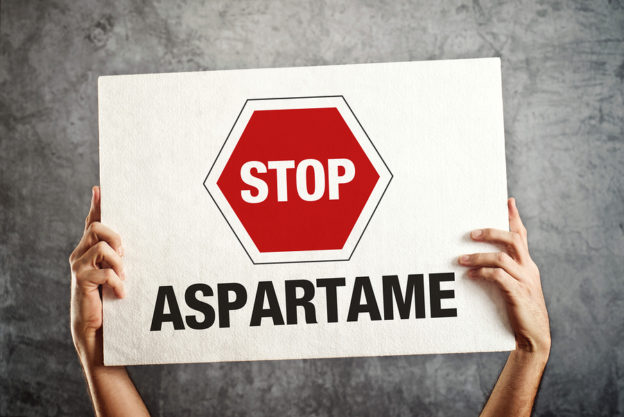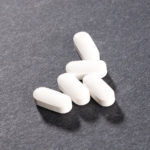By David Blyweiss, M.D., Advanced Natural Wellness
January 24, 2018
- Why it’s time to ditch artificial sweeteners
- Sweet but deadly
- Beware of this bogus natural sweetener
What if you’ve been misled?
What if artificial sweeteners actually contribute to a larger waistline, increase weight gain and lead to a higher incidence of obesity?
What if regular use of no-calorie sweeteners can quickly alter your glucose response and increase your risk of metabolic syndrome and type 2 diabetes?
The truth of the matter is this. These fake sugars don’t help you lose weight. And they don’t stop diabetes.
MD Exposes the Hidden Danger to Your Eyes

When your eyesight starts to fail, it's a real problem. Suddenly you can't go to the grocery store... you can't get to the doctor if you have an emergency... you can't meet your friends for dinner…
Your "regular" doctor doesn't have time to keep up with the latest research. And the same goes for eye doctors. They go to school to learn how to fit you for glasses and contacts, but have no way of preventing the damage and loss of eyesight that threatens your freedom and independence.
Let me show you something that explains a LOT about how your eyes work.
In my FREE Special Report, I'll show you a HUGE, untapped resource for your eyes that safely and naturally restores clear, effortless eyesight.
Click here to get started...
Worse yet, they might actually contribute to – and increase your risk of – all the health concerns you were trying to avoid in the first place!
Given these facts alone, you would think artificial sweetener use would be at an all time low these days. Instead, their use is soaring. More than 41% of all adults report using them.
Sugar Substitutes: Sweet but Deadly
Excess weight is associated with many negative health outcomes, such as high blood pressure, heart disease, stroke, dementia and other health issues. Not surprisingly, metabolic syndrome and diabetes are linked to these same health problems.
So the idea of using a no-calorie sweetener to help control weight and glucose metabolism seems like a very reasonable way to keep all of these other deadly health threats at bay.
Unfortunately, that’s not the case. Not only do these sugar-free sweeteners contribute to a larger waistline and the development of metabolic disorders, they also greatly add your chances of developing some extremely dangerous health issues.
- People with the highest intake of non-nutritive sweeteners are more likely to experience high blood pressure and heart disease.
- Daily consumption of diet soda can increase your risk of a vascular event, such as heart attack or stroke, by about 43%.
- Two or more servings of artificially sweetened beverages a day may double your chances of experiencing a decline in kidney function.
- Individuals who drink at least one diet soft drink daily are three times more likely to develop dementia.
Here’s the thing. It’s easy to pick up low- and no-calorie foods at the store. However, most of them can only make those claims because they contain artificial sweeteners. This is true of many yogurts, whole wheat breads, salad dressings and other healthy sounding products you use every day.
And, of course, any time you reach for a package of NutraSweet or Splenda to sweeten your coffee, tea, grapefruit, oatmeal or other foods and beverages, you expose yourself to these same health risks.
Some of the ones you need to watch out for include:
The World's Quickest Solution for Ending Prostate and Urinary Misery
This has recently been revealed to be one of the only real breakthroughs in prostate health.
The seeds of a strange fruit (sometimes called "Chinese Apples") hold powerful phytonutrients that are a revolution in prostate health.
In fact, UCLA and Veterans Administration research have now proved this to be true.
Not only that, but it may be the worlds quickest solution for ending prostate misery.
Simply stated, these phytonutrients represent a huge step beyond beta sitosterol, saw palmetto, and other phytosterols alone.
Simply click HERE if you want to have fast prostate relief...restful, uninterrupted sleep...no more constant "urges to go"...enhanced virility...and optimal prostate support for life.
| Sweetener Name | Brand Names |
| Acesulfame Potassium | Sweet One |
| Aspartame | Nutrasweet, Equal |
| Saccharin | Sweet ‘N Low |
| Sucralose | Splenda |
Beware of Deceptive Stevia Sweeteners
If you want to sweeten your foods and beverages without the dangers associated with artificial sweeteners, sugar or high fructose corn syrup, I recommend using stevia. It’s a safe, calorie-free sweetener that doesn’t carry any of the risks you find with refined sugar or artificial sweeteners.
In fact, it has some decidedly beneficial health effects.
First and foremost, compared to sugar and no-calorie sweeteners, stevia reduces after-meal glucose and insulin response – meaning it has a positive effect on your metabolism.
Secondly, regular use of stevia can help lower blood pressure by up to 12 points on the top number (systolic) and 8 points on the bottom (diastolic) in people with hypertension. And the results start showing up after just two weeks of use.
But here is a word of warning. If you choose to try stevia, don’t go out and buy Truvia. It’s not the same thing.
This product is advertised as a “stevia-based” sweetener. But it doesn’t contain an ounce of steviosides. Instead, it has a tiny, insignificant amount of rebaudioside in it. While this compound comes from the stevia plant, it doesn’t have the same health benefits.
In truth, the main ingredient in Truvia is erythritol, a sugar alcohol that’s made from genetically altered corn. So make sure to buy a natural stevia sweetener – not one that’s just using the word “stevia” to make it sound healthy.
SOURCES:
Young, R.L., et al., Impact of artificial sweeteners on glycaemic control in healthy humans [abstract], in European Association for the Study of Diabetes Annual Meeting 2017. Lisbon, Portugal.
Sylvetsky AC, et al. Consumption of Low-Calorie Sweeteners among Children and Adults in the United States. J Acad Nutr Diet. 2017 Mar;117(3):441-448.e2.
Azad MB, et al. Nonnutritive sweeteners and cardiometabolic health: a systematic review and meta-analysis of randomized controlled trials and prospective cohort studies. CMAJ. 2017 Jul 17;189(28):E929-E939.
Gardener H, et al. Diet soft drink consumption is associated with an increased risk of vascular events in the Northern Manhattan Study. J Gen Intern Med. 2012 Sep;27(9):1120-6.
Gardner C, et al. Nonnutritive sweeteners: current use and health perspectives: a scientific statement from the American Heart Association and the American Diabetes Association. Circulation. 2012 Jul 24;126(4):509-19.
Pase MP, et al. Sugar- and Artificially Sweetened Beverages and the Risks of Incident Stroke and Dementia: A Prospective Cohort Study. Stroke. 2017 May;48(5):1139-1146.
Anton SD, et al. Effects of stevia, aspartame, and sucrose on food intake, satiety, and postprandial glucose and insulin levels. Appetite. 2010 Aug;55(1):37-43.
Chan P, et al. A double-blind placebo-controlled study of the effectiveness and tolerability of oral stevioside in human hypertension. Br J Clin Pharmacol. 2000 Sep;50(3):215-20.







